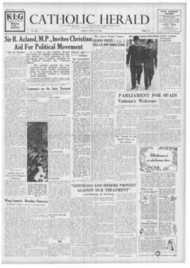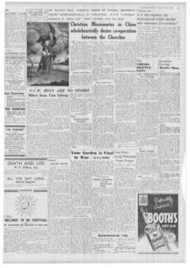Page 4, 24th July 1942
Page 4

Report an error
Noticed an error on this page?If you've noticed an error in this article please click here to report it.
Tags
Share
Related articles
Which Sort Of Catholicism For Spain?
Franco Means Business
A Christian Peace Notes And Comments The Christians Of...
Franco With Warts
NOTES AND COMMENTS
NEW CORTES IN SPAIN
flENERAL Franco's creation of a
new Spanish Cortes or Parliament appears as another step in the consolidation and evolution of the Nationalist regime. It is no doubt intended to broaden the basis of the State by allowing for what Franco describes as "the constitutive elements of the national community in which a contrast of opinions— within the unity of the regime—the hearing of aspirations. documented criticism and legislative technique will contribute to the vitality and perfecting of the law of the revolution and the new economy." Theo, is no question, of course, of making the regime more democratic, in the usual sense of the word, and the General has taketi the occasion to reassert his conviction that " the totalitarian regime has shown itself obviously superior in the military and economic fields and is the only System that can save a nation from ruin."
These will certainly not be pleasant-sounding words in this country or America, but the welcome to the new departure which is expressed in Vatican circles should at least temper criticism. That welcome is an earnest that the word " totalitariankm " in Spain is not to be taken in its extremer sense which would fall within the Church's condemnation. Moreover the conditions of Spanish life and character are better understood at the Vatican than in this country, and the view is no doubt generally taken there that for Spain a strong 'totalitarian " regime within a Christian outlook that allows for a form of national, representation of the " constitutive elements of the national community " is the most suitable order for the present.
REPUBLIC OR MONARCHY
Tinterpretation is, of course, a matter of opinion, and it leaves those who wish well to Spain, whether Catholic or not, to differ from General Franco and the Falan gist National Council. Thus Professor Allison Peers, a stout champion of the Nationalist cause, has recently publicly expressed his misgivings about certain features of the regime as it stands at present. In particular he is worried by Franco's failure to assimilate and convert the opposition, " disloyal Spaniards who think that the solution to our problems will come from abroad,' as the General has just called them; and he expresses his own view that Spain would do well to work back to the 1931 Republic—a very different thing. of course, from the depths to which that Republic sank just before the Civil War, depths which caused many of Spain's most convinced Liberals to throw in their lot with the Nationalists.
One hesitates to criticise anyone so familiar with Spain, but we should have thought that the traditional intemperance, especially in politics, of the Spanish character would have militated against any such " compromise" solution. A vigorous, clear-cut and picturesque regime one way or another is surely needed, and the problem is to afford within such a regime the means of criticism and dissension that will not degenerate into national anarchy. In this connection the restoration of the Monarchy would appear a far more constructive solution, and this is certainly not ruled our by the latest development. • Nor can we accept the Caudillo's repeated insistence that the sole danger tp Spain and Europe lies in Communism. There is another danger which, whether greater or less in itself, certainly lies much nearer to Spain. and some Spanish Bishops have not hesitated to make quite clear just what it is.
FRENCH WARSHIPS
A DELICATE situation has arisen " with regard to the French fleet at Alexandria. The Vichy Government has communicated to Admiral Godefroy, in command of the fleet, the following decision: " In the event of British forces evacuating Alexandria, the squadron is to attempt to reach a French port. If they find this impossible, it should remain in Alexandria under the French flag." It is added that in no case is it to follow the British forces in their withdrawal. The Admiral has been told never to allow these ships to fall into foreign hands.
This decision has been communicated to the German and Italian Governments and has received their approval as being in accord with the terms of the Armistice. The American Government, to whom the decision was also communicated, takes another view. In a second Note, following an initial protest, President Roosevelt proposed that the French warships should be sent to Martinique under an Anglo-American guarantee. The British contention is that, since at the time France fell, the ships were serving under the command of the British Commanderin-Chief in the Mediterranean, they are outside the terms of the Armis
lice. danger of repeating the tragedy of Mers-el-Kebir is certainly very real, and the utmost care and self-restraint will have to be exercised if there is not to be a repetition of the situation which brought us into armed conflict with oui former Allies.
An easy solution might be found if the fleet was allowed to proceed to a neutral port, say Lisbon.
CATHOLICS IN GERMANY
sOME interesting statistics of a German diocese, taken as typical of other German dioceses, were given last week by the Vatican
Radio. The diocese selected was that of Regensburg (Ratisbon) in Bavaria, a suffragan of the Munich Archdiocese.
According to the Vatican announcer, there are 1,033,323 Catholics in the diocese. 1,263 secular priests are actively engaged in pastoral work, except for 131 who are serving in the Forces. Of the 250 students in the ecclesiastical semin ary 247 are nciw serving. In the year to which the statistics refer 487 persons left the Church, while 75 entered it. There were 4,307 marriages, of which 367 were "mixed."
Some readers may be surprised at the enormous size of this diocese, but the following figures show that it is not exceptional. According to the last Pontifical Annual to hand, Munich had 1,307,311 Catholics, Munster 1,742,158, Trier 1,477,451, Freiburg 1,457,254, Colo g n e 2,500,000, Breslau 1,990,934, Berlin 574,815, Bamberg 493.844, Pader'born 1,655,183, Augsburg 943,086, and so on.
When Catholics think of Germany and the Germans in relation to war and peace, they would do well to balance their views by recalling such statistics. To condemn the Germans wholesale and without discrimination on international and national issues is to condemn these dioceses, which are among the most flourishing_ and fervent in the Church. And without in the smallest degree denying the evidences of bitter persecution, attested once again by the Bishop of Freiburg, it is well to recall the scale of the Church in Germany and the amount of spiritual and sacramental life that still exists there.
blog comments powered by Disqus







